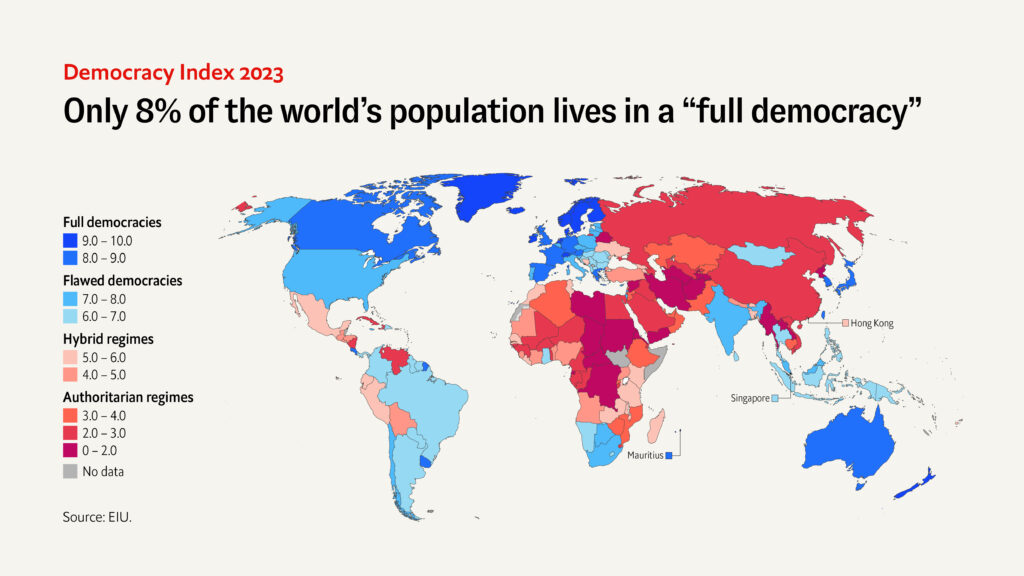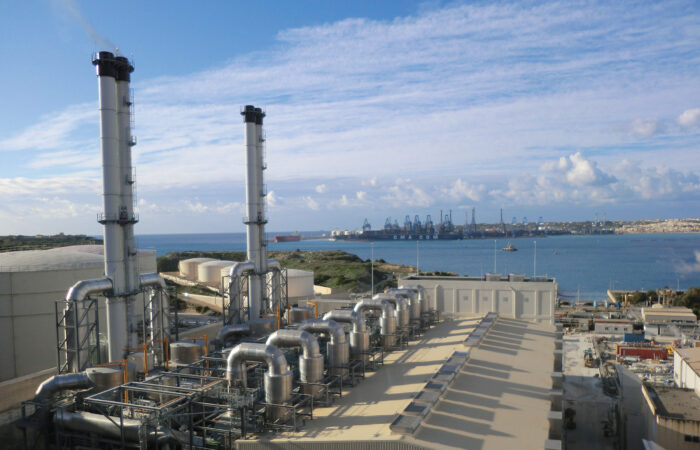Charles Ellinas*
That’s according to the 2023 edition of the Economist Intelligence Unit’s (EIU) annual Democracy Index, published in mid-February. In contrast to Cyprus, Greece has moved up five places in the global rankings, from 25th to 20th, and is now classified as a full democracy.
Cyprus remains in 37th place worldwide. Excluding Turkey, it remains at the bottom of the ‘Western’ European rankings. Among EU countries, the Scandinavian countries top the list.
The Economist’s Democracy Index ranks each country in five categories – electoral process and pluralism, functioning of government, political participation, political culture and civil liberties.
Although Cyprus’ Democracy Index remained unchanged in 2023, it has been on a downward trend since 2016. Cyprus continues to perform poorly in ‘political participation’, ‘political culture’ and ‘functioning of government’. It does particularly badly on the latter, with by far the lowest score among EU member states and on a par with countries such as the Dominican Republic and Kenya – well below Greece, but slightly better than Turkey.
Greece has made a remarkable improvement since last year and now ranks just below the UK on the Democracy Index. It ranks 9th among EU member states. Greece scored particularly well on ‘political participation’, but where it really excelled was in ‘electoral process and pluralism’, where it scored the highest marks – ten out of ten – a feat shared by only a dozen other countries out of the 167 assessed in the survey.
Greece had been in the ‘flawed democracy’ category since 2010, ‘when the Greek sovereign debt crisis led to a prolonged political and economic crisis and social trauma… the sidelining of traditional systemic parties and a polarisation of Greek politics’. The Economist attributes the improvement to increased engagement in politics in 2023, pointing out that “the election of New Democracy under Prime Minister Kyriakos Mitsotakis in 2019 led to an economic recovery and a gradual improvement in public confidence in government.”
In Cyprus, unfortunately, the results of a public opinion poll in Kathimerini in February show nothing of the kind and are disheartening. The public is deeply disappointed with the government and “reveals a society in growing despair, watching in awe as the country moves in the wrong direction and the cost of living deteriorates, crushing the quality of life”.
The unresolved Cyprus problem pervades everything on the island, with 73% of respondents criticizing the government’s handling of it. Even more, 80% are dissatisfied with the government’s management of the economy.
The problems are numerous and long-term and have worsened since 2013 – the most serious being a lack of vision, increasing corruption, impunity, lack of accountability, lack of checks and balances in government and public institutions, and unfulfilled promises.
Cyprus is not alone in falling behind. Only 24 countries out of 167 were classified as fully fledged democracies, with 59 classified as ‘authoritarian regimes’.
The Democracy Index says we live in an age of increasing polarisation and conflict. In general, “if we look at where war and conflict are today, there seems to be a strong correlation between democracy and peace and non-democracy and conflict. Today’s wars are concentrated in countries where democracy is absent or in trouble”.
The Democracy Index shows that the condition of fully free and fair elections prevails in only 43 of the 76 countries holding elections in 2024, 27 of which are EU member states. Eight of the world’s ten most populous countries – Bangladesh, Brazil, India, Indonesia, Mexico, Pakistan, Russia and the United States – will hold nationwide elections in 2024. But in half of these countries, elections are neither free nor fair, and many other prerequisites of democracy, such as freedom of expression and association, are lacking.
For Cyprus, the Economist Intelligence Unit’s Democracy Index shows that democratic values are systematically lagging behind the rest of the Western world, particularly in the ‘functioning of government’. The last ten years have seen a marked deterioration. Let’s hope that the next ten will be different.
*Charles Ellinas is Senior Fellow at the Global Energy Centre of the Atlantic Council.




